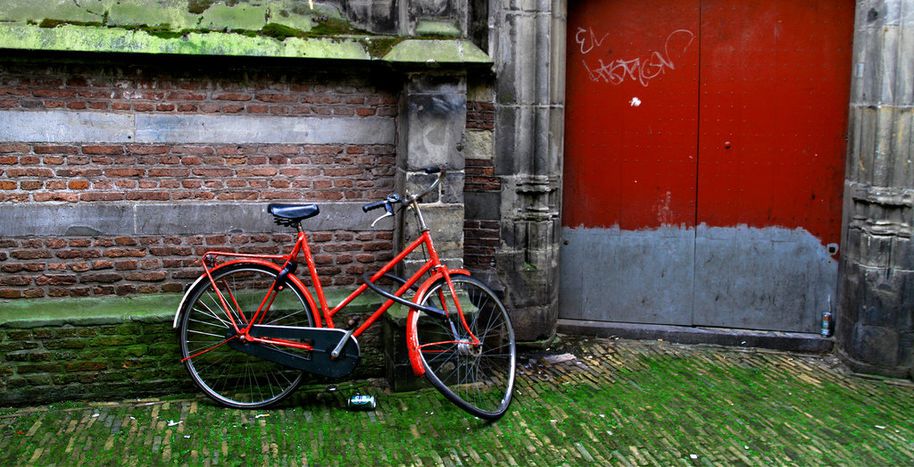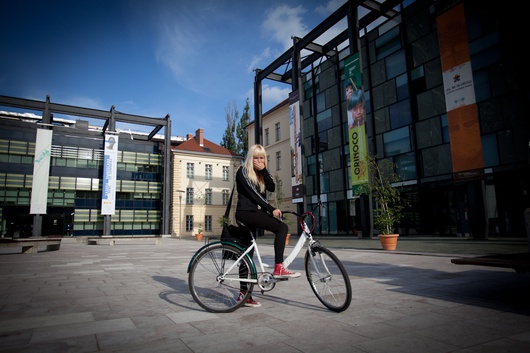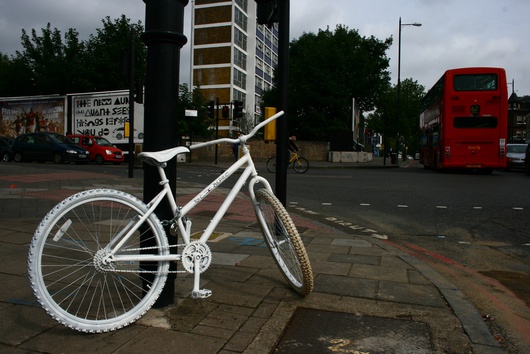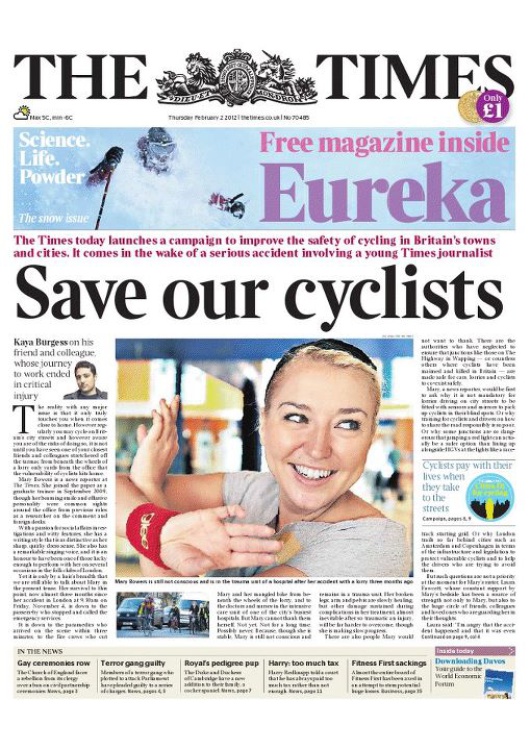
cafebabel.com London is back - and supporting the British media's 'safer cycling campaign'
Published on
In November 2011 British journalist Mary Bowers, 27, was involved in a collision with a large lorry at Wapping Junction as she cycled to work, where she is a reporter at the national newspaper The Times.
It's now February 2012 and she still has not yet woken up from her coma, though her body is steadily healing. Mary is an acquaintance of cafebabel.com.
We are all fully behind her recovery, and back the calls for improving the cycling system in the English capital.
On an anecdotal note, London cyclists are generally quite safety-conscious; at least 50% of my friends in London use a bike, wear a helmet, protective clothing, and so on. It's not the case really for the fashion-conscious Parisians I pass everyday on the way to work here. But then again, the city is relatively smaller and better connected so you hear much less about cycling in the French capital. It's more a lifestyle choice than a proper transport method for locals.
Over its eleven years of existence cafebabel.com has published a ton of articles from its citizen reporters about cycling. You can see some of them here; yet no-one has looked beyond the trend or the fad to the safety of it.
 Slovenians are one of three European Union member countries to have to wear helmets whilst cycling by law. Image: © Lucille Caballero for 'Green Europe on the ground by cafebabel.com, June 2011, Ljubljana
Slovenians are one of three European Union member countries to have to wear helmets whilst cycling by law. Image: © Lucille Caballero for 'Green Europe on the ground by cafebabel.com, June 2011, Ljubljana
The Times have launched a Safer Cycling Campaign. As Mary's friend and colleague Kaya Burgess writes,
'As a point of comparison: since 2001, 576 British soldiers have been killed in Afghanistan and Iraq; 1,275 cyclists died on British streets. The latest data shows there were 1,850 deaths or serious injuries in the first half of 2011, a 12 per cent rise on the year before. Britain leads the world in competitive cycling; it is time that we did the same for the cyclists on our streets.'
Europe in this
On a European level, the Vienna convention of 1968 is the white paper on pedestrian and cycling safety in the EU. At cafebabel.com we can contribute to an awareness on a pan-European level about safer cycling in our own cities and towns. Copenhagen and Amsterdam are regularly quoted as European models for this.
Whilst London is a magnificent city, loved by its locals, foreigners, and is a veritable melting pot of cultures, sounds, images, lifestyles, it's also a city which is home to the 'white ghost bikes' - memorials of bicycles painted white and locked to the places where Londoners have been injured, sometimes fatally, or killed in bike accidents - 3, 000 from October 2010 to September 2011.
 White bike in Stoke Newington, north London, in memorial, 2008. Image: (cc) Nicobobinus/ Flickr
White bike in Stoke Newington, north London, in memorial, 2008. Image: (cc) Nicobobinus/ Flickr
The lowest percentile of cyclists, according to a 2009 report by the European commission, is in Finland. The same report points out that there are 6% of cyclist fatalaties (and 17% of pedestrians) in the 27 European union countries, with children aged between 6 - 14 being the victims most at risk. 80% of European accidents involve a motor vehicle. (Some more interesting facts: cycle helmets have been mandatory in Malta since 2004, in Sweden, Slovenia and the Czech Republic for children up to 15 years of age, and in Spain for all cyclists outside urban areas.)
It's been a three month wait for Mary to get better. The Times has correctly shown where it stands on infrastucture, investment and education of, in and about the cycling system in London. Of course it's a shame it takes something like this to happen to slap us all around the face for action. The great thing about Mary and her British colleagues is their resilience and belief. I was at Paris' Charles de Gaulle airport in early February when I saw Mary's face beaming out at me from the front page of The Times. The few shop assistants I showed the newspaper to sent their get well messages and at least knew the story behind the picture. It shouldn't be this way, but it is, so it's no longer about 'let's do something about it', but 'we are doing something about it'.

Mary's family are running a great blog updating on her condition and the situation in London, which is regularly updated where possible here. By January it reached over 5, 000 views. Mary is also a great musician and you can hear some of her band's music here.



